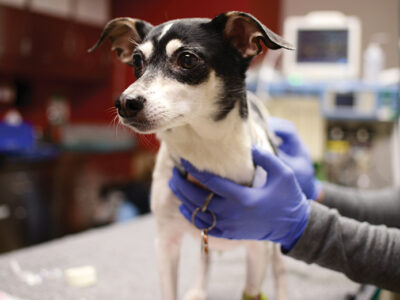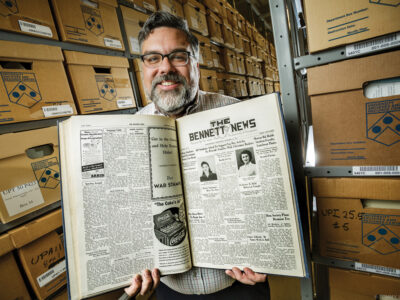150 Years of “Caressing the Divine Details” of Engineering

“I can see a day not very far off when the school that practically invented engineering becomes a world hub in life sciences and information technology,” said Penn President Judith Rodin during the School of Engineering and Applied Science’s 150th anniversary celebration in September. “I can’t wait to look back in 25 years and say, ‘I told you so.’”
While it may have been hyperbolic to suggest that the school invented engineering, there is no question that it has had its full share of innovations over the years, including the invention of ENIAC (Electronic Numerical Integrator and Computer), the world’s first electronic, large-scale, general-purpose digital computer—in 1946. It also established the country’s first significant laboratory in electromedical research; awarded the nation’s first doctoral degree in bioengineering; and established one of the country’s first bioengineering departments.
The school celebrated its birthday with a display of “combat robots,” a 150-foot hoagie, a performance by Mask & Wig, speeches, and an appearance by Benjamin Franklin, played by actor Ralph Archbold. It also presented the University of Pennsylvania Medal for Distinguished Achievement to Dr. William Wulf, president of the National Academy of Engineering, who told an audience at Irvine Auditorium that engineering has “revolutionized virtually every aspect of the way we live, work, play, and travel.”
“At Penn we teach our students to be creative, and we also insist that they be rigorous,” said Dr. Eduardo Glandt GCh’75 Gr’77, dean of the school. “Because, to paraphrase Nabokov, engineers need to know how to ‘caress the divine details.’
“Our profession is quintessentially American,” he added. “It has frequently been the choice of first-generation college students and thus has promoted social advancement in our democracy. How appropriate that our school was founded just a few blocks away from where American democracy was born!”
If the real Franklin “could see us now, he would be very proud,” concluded Glandt. “And I, too, could not be more proud to be part of this school at this time.”
Half a Century of Animals and Optimism at New Bolton Center

In 1952, the University purchased a 220-acre farm in Chester County, Pa., and turned it over to the School of Veterinary Medicine as the site for its large-animal campus. New Bolton Center was thus conceived as an “act of sublime optimism,” in the words of Dr. Alan M. Kelly Gr’67, the Gilbert S. Kahn Dean of the school.
“The transformation of New Bolton Center from impoverished country club to world leader in a mere five decades did not come easily,” recalled Dr. Robert Marshak, dean of the school from 1973 until 1987, in a recollection written for Bellwether, the school’s quarterly magazine. But during that time it has nonetheless grown to 687 acres and has become famous for a broad range of veterinary services, breakthroughs, and milestones. Described as “the world’s foremost equine center” by The New York Times, New Bolton was the birthplace of the first calf born from in-vitro fertilization, and is now home to—among other things—the Center for Animal Transgenesis and Germ Cell Research.
On September 21, the center celebrated its 50th birthday with a six-horse Percheron draft hitch, FEMA search-and-rescue dogs, and sheep-herding demonstrations.




